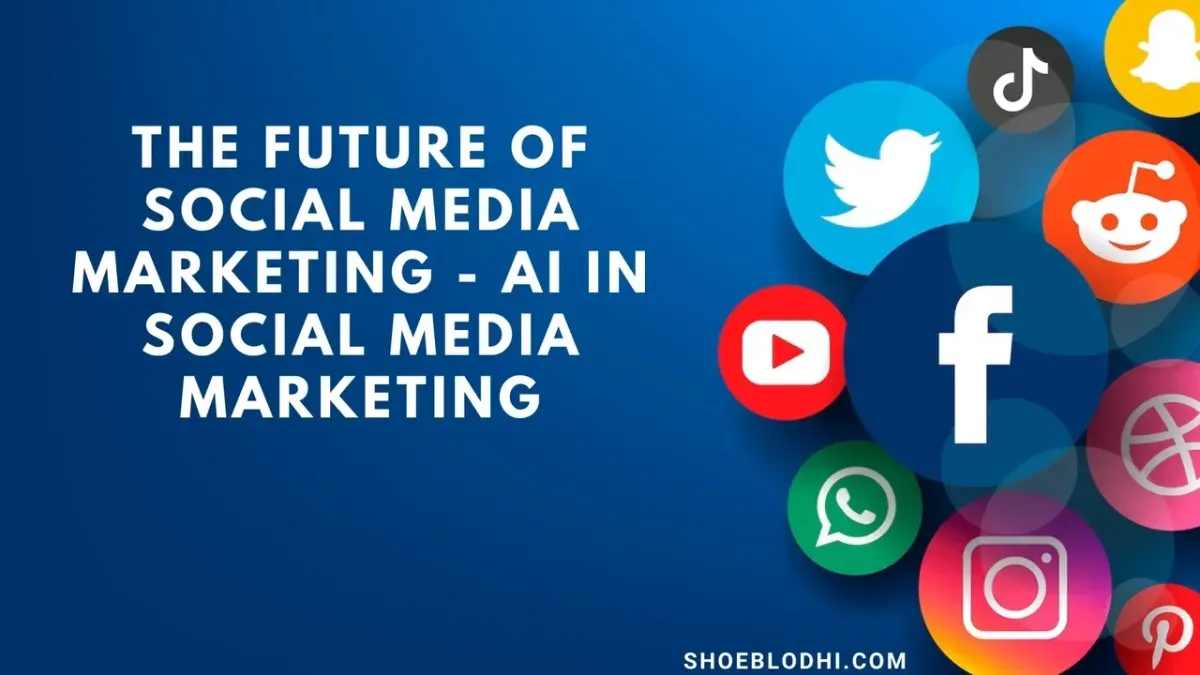Marketing, Business and Technology Blogs

Future of Social Media Marketing - AI in Social Media Marketing
Social media has become an integral part of our daily lives, and it continues to shape the way businesses connect with their target audience. As a mid-career digital marketer, staying up-to-date with the latest trends and opportunities in social media marketing is crucial for enhancing your skills and maximizing your career potential. In this comprehensive article, we will explore the future of social media marketing, highlighting emerging trends, opportunities, and key strategies to help you stay ahead in this ever-evolving landscape.
The Evolution of Social Media Marketing
Social media marketing has come a long way since its inception. Initially, businesses used social platforms primarily for brand awareness and customer engagement. However, today, social media has transformed into a powerful marketing channel with a multitude of opportunities. Here are some key trends shaping the future of social media marketing:
1. Influencer Marketing: AI in Social Media Marketing has gained significant traction in recent years. Collaborating with influencers allows businesses to leverage their credibility and large followings to reach and engage their target audience effectively.
2. Video Content Dominance: Video content continues to dominate social media platforms. With the rise of platforms like YouTube, TikTok, and Instagram Reels, businesses are harnessing the power of short-form videos to deliver engaging and impactful marketing messages.
3. Social Commerce: Social media platforms are increasingly integrating e-commerce functionalities, enabling businesses to sell products directly to their audience. The ability to showcase and purchase products seamlessly within social platforms opens new avenues for revenue generation.
4. Augmented Reality (AR) and Virtual Reality (VR): AR and VR technologies are transforming the social media experience. From interactive filters and lenses to virtual shopping experiences, businesses can leverage these immersive technologies to engage their audience in unique and memorable ways.
Strategies for Success in Social Media Marketing
To thrive in the future of social media marketing, here are some strategies and best practices to consider:
1. Deep Audience Understanding: Develop a deep understanding of your target audience. Conduct thorough market research, leverage analytics tools, and gather customer insights to create highly targeted and personalized social media campaigns.
2. Content Diversification: Embrace a diverse range of content formats to cater to different audience preferences. Experiment with videos, live streaming, user-generated content, stories, and interactive content to keep your audience engaged and interested.
3. Authenticity and Transparency: Consumers value authenticity and transparency from brands. Be genuine in your interactions, share behind-the-scenes content, and establish a transparent relationship with your audience to build trust and loyalty.
4. Data-Driven Decision Making: Use social media analytics tools to track and measure the performance of your campaigns. Analyze key metrics such as engagement rates, click-through rates, and conversion rates to gain insights and optimize your strategies for better results.
5. Social Listening and Customer Engagement: Actively monitor social media conversations related to your brand and industry. Engage with your audience, respond to their queries and feedback, and leverage social listening tools to identify trends and sentiment surrounding your brand.
Emerging Opportunities in Social Media Marketing
As social media continues to evolve, new opportunities arise for digital marketers. Here are some emerging opportunities to explore:
1. Micro-Influencers: Alongside traditional influencers, consider collaborating with micro-influencers who have a smaller but highly engaged and niche audience. These influencers can offer a more targeted and authentic reach for your brand.
2. User-Generated Content Campaigns: Encourage your audience to create and share content related to your brand. User-generated content not only boosts engagement but also serves as social proof, fostering trust and credibility among your audience.
3. Social Media Customer Service: With customers increasingly turning to social media for support, prioritize delivering exceptional customer service through social channels. Respond promptly, address concerns using AI in
Social Media Marketing, and provide valuable assistance to enhance the customer experience.
4. Social Listening for Market Insights: Utilize social listening tools to gain valuable market insights. Monitor industry conversations, identify emerging trends, and stay informed about your competitors to capitalize on new opportunities.
The Role of AI in the Future of Social Media Marketing
AI in Social Media Marketing is playing an increasingly significant role in shaping the future of social media marketing. AI technologies offer advanced capabilities for data analysis, content creation, audience targeting, and customer engagement. Here are some key areas where AI is making an impact:
1. Data Analysis and Insights:
AI-powered algorithms can analyze vast amounts of social media data, including user behavior, preferences, and trends. By leveraging machine learning techniques, AI can identify patterns, extract valuable insights, and provide marketers with a deeper understanding of their audience. This data-driven approach allows marketers to make informed decisions and optimize their social media strategies for better results.
2. Content Creation and Personalization:
AI technologies enable the automation of content creation processes. Natural Language Processing (NLP) algorithms can generate engaging and relevant social media posts, captions, and even articles based on predefined criteria. This streamlines content production, saves time, and helps marketers deliver personalized messages to their target audience at scale.
3. Audience Targeting and Segmentation:
AI-powered tools can analyze user data and behavior to create detailed audience profiles and segments. By leveraging machine learning algorithms, marketers can identify specific target groups and deliver highly targeted content and advertisements. This level of precision ensures that marketing efforts reach the right audience, resulting in improved engagement and conversion rates.
4. Chatbots and Customer Service:
AI-driven chatbots are revolutionizing customer service on social media platforms. These intelligent bots can engage with customers, answer frequently asked questions, and provide real-time assistance. By automating customer service processes, businesses can enhance the customer experience, provide quick responses, and free up human resources for more complex inquiries.
The Rise of Marketing Automation and ML for Data-Driven Strategies
Marketing automation is a powerful trend that utilizes AI and Machine Learning (ML) algorithms for data-driven marketing strategies. By automating repetitive tasks and leveraging ML algorithms for data analysis, marketing automation platforms enable marketers to deliver personalized experiences, optimize campaigns, and maximize ROI. Here's how marketing automation and ML contribute to data-driven strategies:
1. Data Collection and Analysis:
Marketing automation platforms collect and consolidate data from various sources, including social media platforms, websites, and customer relationship management (CRM) systems. ML algorithms analyze this data to uncover meaningful insights about customer behavior, preferences, and purchase patterns. This data-driven approach allows marketers to segment their audience, personalize campaigns, and make informed decisions based on actionable insights.
2. Personalization at Scale:
Marketing automation platforms leverage ML algorithms to deliver personalized experiences to individual customers. By analyzing customer data, marketers can create dynamic content, recommend relevant products, and tailor messages based on each customer's preferences and needs. This level of personalization enhances customer engagement and increases the likelihood of conversion.
3. Campaign Optimization:
ML algorithms within marketing automation platforms continuously analyze campaign performance and optimize marketing efforts in real-time. By monitoring key metrics, such as click-through rates, conversion rates, and engagement levels, ML algorithms can identify underperforming areas and suggest data-backed adjustments to improve campaign effectiveness. This iterative optimization process ensures that marketing efforts are continuously refined for maximum impact.
4. Predictive Analytics:
ML algorithms can predict customer behavior and trends by analyzing historical data. Marketing automation platforms utilize predictive analytics to identify potential high-value customers, forecast sales, and optimize marketing budgets. By leveraging ML algorithms, marketers can make data-driven predictions and tailor their strategies to target customers who are most likely to convert, resulting in improved ROI.
5. Customer Journey Mapping:
Marketing automation platforms enable marketers to map out and automate the customer journey across multiple touchpoints. ML algorithms analyze customer interactions, behavior, and preferences to create personalized customer journeys that guide individuals through the marketing funnel. This automated approach ensures consistent messaging, timely follow-ups, and a seamless customer experience.
In conclusion, the future of social media marketing is intertwined with AI in Social Media Marketing and ML technologies. AI in Social Media Marketing enhances social media marketing efforts by providing advanced data analysis, content creation, audience targeting, and customer engagement capabilities. Additionally, marketing automation platforms powered by ML algorithms enable data-driven marketing strategies by automating tasks, collecting and analyzing data, delivering personalized experiences, optimizing campaigns, and predicting customer behavior. Embracing these AI in Social Media Marketing technologies allows digital marketers to stay ahead of the curve, enhance their skills, and achieve success in the dynamic landscape of social media marketing.
Related Article: How to Drive Audience Engagement Using Content Marketing
Related Article: Data-Driven Digital Marketing Strategies to Maximizing ROI
Related Article: A Comprehensive Guide to Learning Digital Marketing and Exploring Diverse Career Opportunities
Related Article: Starting a Digital Marketing Business: Essential Strategies and Services for Success
Related Article: Small Online Business Idea: A Practical Example of Strategy, Plan, and Calendar for Exploring the Interconnected Components of Marketing
Related Article: Starting an E-commerce Business in Pakistan: Your Ultimate Guide to a Secondary Source of Income
Done For You Sales Qualified lead Gen Services
Experience seamless lead generation with our Done For You Sales Qualified Lead Generation Services. Our expertly crafted marketing program ensures a steady flow of prospects who are actively seeking your services.
We meticulously double-verify the interest of each lead via phone, guaranteeing high intent and sales qualification. Within minutes, these leads are seamlessly funneled into your CRM or Marketing Automation platform of choice, ready for immediate action. Trust us to deliver the highest quality standard for your lead generation needs, just like some of the largest companies in the industry have experienced massive success with our program. Let us handle the heavy lifting while you focus on growing your business.

Innovation
Fresh, creative solutions.

Integrity
Honesty and transparency.

Excellence
Top-notch services.

FOLLOW US
COMPANY
CUSTOMER CARE
LEGAL
Free Resources
©Copyright 2026. shoeblodhi.com in partnership with VMarket Digital. All Rights Reserved.

